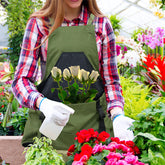How to Protect Garden Tools from Rust: Essential Tips for Every Gardener
Table of Contents
- Introduction
- Understanding Rust: The Science Behind the Deterioration
- Essential Practices for Preventing Rust on Garden Tools
- Seasonal Maintenance: The Best Time for Tool Care
- Choosing the Right Garden Tools
- Conclusion
Introduction
Have you ever reached for your trusty spade only to find it covered in rust, rendering it nearly useless? You're not alone. Rust is a common enemy for gardeners everywhere, and it can quickly turn your beloved tools into relics of the past. Surprisingly, studies show that inadequate maintenance can reduce the lifespan of garden tools by up to 50%. This stark reality makes it crucial for us to learn how to protect our garden tools from rust.
At Garden Greenland, we believe that every gardening enthusiast deserves access to tools that function beautifully and last for years. Our journey began with a passion for the earth and a commitment to redefining home gardening experiences. In this post, we will explore effective strategies for preventing rust on your garden tools, ensuring they remain in top condition for all your gardening needs.
By the end of this article, you will understand the main causes of rust, practical steps for cleaning and storing your tools, and the best products to use for maintenance. Together, we will navigate the essential practices that will empower you to keep your garden tools rust-free, enhancing your gardening experience and prolonging the life of your equipment.
Understanding Rust: The Science Behind the Deterioration
Rust is more than just a cosmetic issue; it indicates the oxidation of iron and its alloys. When metal tools are exposed to moisture and oxygen, a chemical reaction takes place, leading to corrosion. This not only affects the aesthetic appeal of your tools but also their functionality.
The Causes of Rust
- Moisture Exposure: Tools that are frequently exposed to rain or humidity are at a higher risk of rusting.
- Improper Storage: Leaving tools on the ground or in damp sheds can accelerate rust formation.
- Neglect: Failing to clean tools after use can leave behind dirt and sap, which can trap moisture and promote rust.
The Impact of Rust on Garden Tools
Rust weakens the material of your tools, making them more prone to breakage. It also affects the efficiency of your work; a rusty blade won't cut as effectively, leading to more frustration in the garden. Investing time in preventive measures can save you both time and money in the long run.
Essential Practices for Preventing Rust on Garden Tools
Now that we understand rust's causes and implications, let's dive into practical strategies for protecting our garden tools.
1. Clean Your Tools Regularly
Cleaning your tools immediately after use is one of the most effective ways to prevent rust. At Garden Greenland, we recommend these simple steps:
- Rinse Off Debris: Use a garden hose to remove soil and plant residue. This keeps your tools clean and ready for their next use.
- Scrub with a Wire Brush: For stubborn dirt, a wire brush can effectively scrub away grime. Keep one handy near your garden area for convenience.
- Sanitize When Necessary: If you've worked with diseased plants, dip your tools in a diluted bleach solution to prevent the spread of pathogens.
2. Dry Tools Thoroughly
Moisture is the enemy of metal. Once you've cleaned your tools, always dry them thoroughly with a clean cloth. If possible, allow them to air dry in a well-ventilated area to ensure no dampness remains.
3. Store Tools Properly
Proper storage is crucial for rust prevention. Here are some storage tips to consider:
- Keep Tools Off the Ground: Hang tools on hooks or a pegboard to prevent contact with moisture from the ground.
- Use a Dry Location: Store tools in a dry garage or shed, away from excess humidity.
- Utilize Sand: For small tools like trowels and spades, consider storing them in a pot filled with sand. The sand absorbs moisture and keeps the metal dry.
4. Apply Protective Coatings
Applying a protective coating can create a barrier against rust. Here are some effective options:
- Linseed Oil: This natural oil is excellent for conditioning both metal and wooden parts of your tools. Apply it lightly to the blades and handles to protect them. Linseed oil is eco-friendly and safe for your soil, aligning with our commitment to sustainability at Garden Greenland.
- Multipurpose Oil: Products like 3-in-One oil are great for lubricating and protecting your tools. Use them on hinges and moving parts to improve functionality and prevent rust.
5. Handle Rust Promptly
Even with the best preventive measures, rust may occasionally appear. If you notice rust on your tools, take immediate action:
- Use Steel Wool or Sandpaper: For light rust, scrub the affected areas with fine steel wool or sandpaper until the rust is removed.
- Try Vinegar or Baking Soda: Soaking tools in white vinegar can help dissolve rust. Alternatively, create a paste with baking soda and water to scrub away rust.
- Condition After Treatment: After removing rust, don’t forget to apply linseed oil or a similar product to protect the freshly cleaned metal.
Seasonal Maintenance: The Best Time for Tool Care
Maintaining your tools shouldn't be a last-minute chore. Being proactive about tool care can significantly enhance their longevity.
Winter: A Time for Reflection and Restoration
Winter is an ideal time for gardeners to evaluate their tools and perform necessary maintenance.
- Assess and Clean: During the colder months, take stock of your tools. Clean and remove any rust that may have developed over the growing season.
- Sharpen Blades: Sharpening your tools ensures they are ready for action when spring arrives. A sharp blade makes cleaner cuts, promoting plant health.
- Condition and Store: After cleaning and sharpening, apply protective oil and store your tools properly to ensure they remain rust-free until you need them again.
Choosing the Right Garden Tools
Investing in high-quality tools can make a significant difference in your gardening experience. At Garden Greenland, we offer a range of premium gardening tools designed to withstand the elements and provide optimal performance:
- Durable Materials: Our tools are made from weather-resistant and high-quality materials designed to resist rust and corrosion.
- Ergonomic Designs: Many of our tools feature ergonomic designs that enhance comfort and usability, allowing you to work efficiently in your garden.
- Full Range of Options: Whether you need garden pots, planters, or tools, explore our Garden Tools Collection to find essentials that suit your gardening needs.
Conclusion
Rust may be a common issue for gardeners, but with the right knowledge and practices, it can be easily prevented. Remember to clean your tools after each use, dry them thoroughly, store them properly, apply protective coatings, and handle any rust promptly. By adhering to these guidelines, you can extend the lifespan of your tools and enhance your gardening experience.
At Garden Greenland, we are committed to empowering gardeners like you to embrace your green thumb. By investing in quality tools and maintaining them properly, you will not only enjoy a more productive gardening season but also foster a deeper connection with nature.
FAQ
1. How often should I clean my garden tools?
We recommend cleaning your tools after each use. This will help prevent dirt, sap, and moisture from accumulating and causing rust.
2. What is the best way to remove rust from garden tools?
Light rust can be removed with steel wool or sandpaper. For more stubborn rust, try soaking tools in white vinegar or using a baking soda paste.
3. Can I prevent rust by using stainless steel tools?
Yes, stainless steel tools are more resistant to rust. However, they still require proper care and maintenance to ensure they remain rust-free.
4. How do I store my garden tools to prevent rust?
Store tools in a dry place, hanging them off the ground when possible. Avoid contact with moisture, and consider using sand to absorb any humidity for smaller tools.
5. Is linseed oil safe for my garden?
Yes, linseed oil is a natural product that is safe for use in your garden. It helps condition both metal and wooden parts of your tools while preventing rust.
By following these practices, we can all safeguard our gardening investments and ensure that our beloved tools are always ready for the next season. Let’s cultivate a flourishing garden together!









